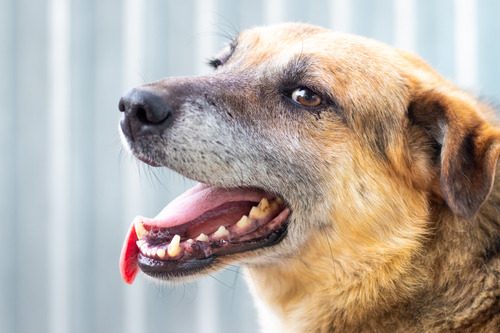Why is My Dog Breathing Heavy?
Playing with your dog in the backyard or taking them for a long walk can be fun and often results in heavy breathing or panting to help lower their body temperature. But if your dog has been resting in an air conditioned room for a while and is still breathing heavily, there may be a more serious health issue affecting your pet. In this blog, we’ll explore the reasons why your dog might be breathing heavy, what this could indicate, and when it’s time to seek professional help. Understanding these aspects can help you ensure your dog stays healthy and comfortable.

What Causes Heavy Breathing in Dogs?
Factors can range from physical exertion to medical conditions. Knowing the potential causes can help you determine whether your dog’s heavy breathing is normal or if it requires veterinary attention. Below, we’ll break down the common reasons for heavy breathing and what each might signify.
Overheating
Dogs often pant to cool down. However, if your dog is breathing heavily even in a cool environment, it might be suffering from heatstroke. Heatstroke is a severe condition that requires immediate veterinary care.
Physical Activity
After vigorous exercise, dogs breathe heavily to meet their increased oxygen demand. If your dog returns to normal breathing after a few minutes of rest, this is typically not a cause for concern. However, prolonged heavy breathing post-exercise warrants a closer look.
Anxiety and Stress
Dogs can breathe heavily when they are anxious or stressed. Loud noises, unfamiliar environments, or separation anxiety can trigger this reaction. It’s important to identify and minimize these stressors to help your dog stay calm.
Medical Conditions Leading to Heavy Breathing
Several medical conditions can cause heavy breathing in dogs.
Respiratory Issues
Respiratory problems, such as infections, asthma, or lung disease, can lead to heavy breathing. Symptoms may include coughing, wheezing, and nasal discharge. If you suspect a respiratory issue, schedule a veterinary appointment promptly.
Heart Disease
Heart disease is another common cause of heavy breathing in dogs. Conditions like congestive heart failure can reduce the heart’s efficiency, leading to labored breathing. Watch for signs like lethargy, coughing, and difficulty exercising.
Pain and Discomfort
Dogs in pain may breathe heavily as a response to discomfort. Injuries, arthritis, or other painful conditions can lead to this symptom. Observing other signs of pain, such as limping or reluctance to move, can help pinpoint the issue.
When Should I Bring My Pet to the Vet?
While some causes of heavy breathing are benign, others can be serious and require immediate veterinary attention. If your dog’s heavy breathing persists or is accompanied by other symptoms, such as coughing, lethargy, or changes in appetite, contact your vet. In cases where your dog is struggling to breathe, has blue or pale gums, or collapses, emergency veterinary care is necessary.
If you have any concerns about your dog’s breathing, reach out to your veterinarian. If you’re in Silver Spring, MD, and your pet requires emergency care or a specialty consultation, contact Apex Vets today.
